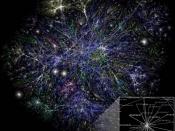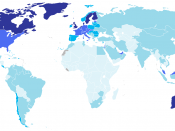The Internet has revolutionised the media
Discuss
On the 4th of October 1957, the USSR launched the world's first satellite named 'Sputnik 1' into Earth orbit. Beating the US to the great feat, the event severely dented the unparalleled sense of security Americans had had since the explosion of the first nuclear bomb thirteen years earlier. An immediate reaction was to set up the Advanced Research Projects Agency (ARPA) within the Ministry of Defence. It was created in order to reduce the chance of US defence again being outdone in technological advances by the 'enemy', and its original remits were related to space, ballistic missiles and nuclear test monitoring. An MIT scientist, John Licklider, who had just recently published a memorandum on the 'Galactic Network concept', headed ARPA's computer research. Whether the original motives for setting up 'ARPAnet' were lessening the potential damage of a nuclear strike on the US, or it was simply a solution to the need for speedy and efficient communications for scientists collaborating on projects, ARPAnet was the world's first decentralised computer network.
As a result of these essential building blocks, today we have a colossal network of computers and servers across the world, a utopia of information spread out across international borders and boundaries, uncensored and uncontrollable by any government or state. The explosion in its use is unprecedented - it took radio 40 years to reach an audience of 50 million, and 15 years for television to reach the same, however it only took 3 years for the Internet to reach this marker (Thussu 2000:225). With the number of world-wide Internet users now standing at 560 million (global reach stats), the internet must be recognised as a medium in itself. Craig Barret, one of Intel's past Chief Executives even goes as far...


